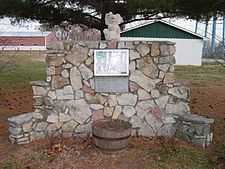Oquawka, Illinois
| Oquawka | |
| Village | |
 Henderson County Courthouse in Oquawka | |
| Country | United States |
|---|---|
| State | Illinois |
| County | Henderson |
| Township | Oquawka |
| Elevation | 562 ft (171 m) |
| Coordinates | 40°56′20″N 90°56′57″W / 40.93889°N 90.94917°W |
| Area | 1.86 sq mi (5 km2) |
| - land | 1.47 sq mi (4 km2) |
| - water | 0.39 sq mi (1 km2) |
| Population | 1,371 (2010) |
| Density | 933.9 / sq mi (361 / km2) |
| Timezone | CST (UTC-6) |
| - summer (DST) | CDT (UTC-5) |
| Postal code | 61469 |
| Area code | 309 |
  Location of Oquawka within Illinois
| |
| Wikimedia Commons: Oquawka, Illinois | |
| Website: http://www.oquawka.com | |
Oquawka is a village in Henderson County, Illinois, United States. The population was 1,371 at the 2010 census. It is the county seat of Henderson County.[1]
Oquawka is part of the Burlington, IA–IL Micropolitan Statistical Area.
Geography
Oquawka is located at 40°56′20″N 90°56′57″W / 40.93889°N 90.94917°W (40.938880, -90.949044).[2]
According to the 2010 census, the village has a total area of 1.86 square miles (4.8 km2), of which 1.47 square miles (3.8 km2) (or 79.03%) is land and 0.39 square miles (1.0 km2) (or 20.97%) is water.[3]
Demographics
2010 census
As of the census[4] of 2010, there were 1,371 people, 627 households, and 378 families residing in the village. The population density was 933.9 people per square mile (360.5/km²). There were 721 housing units at an average density of 491.1 per square mile (189.6/km²). The racial makeup of the village was 98.61% White, 0.07% African American, 0.36% Native American, 0.14% Asian, and 1.30% from two or more races. Hispanic or Latino of any race were 1.46% of the population.
There were 627 households out of which 22.6% had children under the age of 18 living with them, 44.3% were married couples living together, 10.8% had a female householder with no husband present, and 39.7% were non-families. 34.3% of all households were made up of individuals and 36.5% had someone living alone who was 65 years of age or older. The average household size was 2.19 and the average family size was 2.79.
In the village the population was spread out with 21.1% under the age of 18, 3.4% from 18 to 24, 21.2% from 25 to 44, 29.7% from 45 to 64, and 21.8% who were 65 years of age or older. The median age was 46 years. For every 100 males there were 98.4 females. For every 100 females age 18 and over, there were 99.3 males.
The median income for a household in the village was $28,750, and the median income for a family was $50,938. Males had a median income of $40,729 versus $25,500 for females. The per capita income for the village was $17,703. About 12.6% of families and 19.4% of the population were below the poverty line, including 32.4% of those under age 18 and 15.6% of those age 65 or over.[5]
2000 census
As of the census[6] of 2000, there were 1,539 people, 656 households, and 421 families residing in the village. The population density was 1,051.8 people per square mile (407.0/km²). There were 736 housing units at an average density of 503.0 per square mile (194.6/km²). The racial makeup of the village was 98.38% White, 0.06% African American, 0.13% Native American, 0.13% Asian, and 1.30% from two or more races. Hispanic or Latino of any race were 0.71% of the population.
There were 656 households out of which 26.8% had children under the age of 18 living with them, 51.2% were married couples living together, 8.5% had a female householder with no husband present, and 35.8% were non-families. 31.6% of all households were made up of individuals and 16.2% had someone living alone who was 65 years of age or older. The average household size was 2.31 and the average family size was 2.87.
In the village the population was spread out with 22.4% under the age of 18, 8.2% from 18 to 24, 27.0% from 25 to 44, 23.7% from 45 to 64, and 18.7% who were 65 years of age or older. The median age was 40 years. For every 100 females there were 93.8 males. For every 100 females age 18 and over, there were 90.9 males.
The median income for a household in the village was $32,500, and the median income for a family was $38,152. Males had a median income of $29,333 versus $18,571 for females. The per capita income for the village was $15,254. About 8.4% of families and 12.8% of the population were below the poverty line, including 17.6% of those under age 18 and 11.4% of those age 65 or over.
Local attractions
Within the city exists a memorial and grave marker to a circus elephant named Norma Jean, who perished on July 17, 1972 after being struck by lightning. The pachyderm was attached to a small circus that performed in the city. Norma Jean was buried on the spot, and the circus, without its star attraction, closed within a year. Later, local pharmacist Wade Meloan spearheaded the drive to build the monument that stands over her grave.[citation needed]

References
- ↑ "Find a County". National Association of Counties. Retrieved 2011-06-07.
- ↑ "US Gazetteer files: 2010, 2000, and 1990". United States Census Bureau. 2011-02-12. Retrieved 2011-04-23.
- ↑ "2010 Census U.S. Gazetteer Files for Places – Illinois". United States Census. Retrieved 2012-10-13.
- ↑ Profile of General Population and Housing Characteristics: 2010 [United States Census Bureau] retrieved 2012-17-08
- ↑ 2006-2010 American Community Survey 5-Year Estimates [United States Census Bureau] retrieved 2012-17-08
- ↑ "American FactFinder". United States Census Bureau. Retrieved 2008-01-31.
External links
| |||||||||||||||||||||||